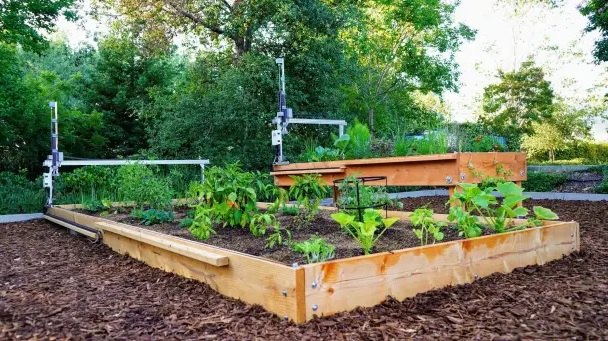Säen, wässern, jäten – Farmbots machen den Gemüsebau einfacher. Die neuen Express-Modelle kommen künftig vormontiert.
Mit Aluminiumprofilen und einem beweglichen Kopf lassen sich nicht nur CNC-Fräsen bauen. Die Open-Hardware-Firma Farmbot baut damit Technik zum automatischen Bewirtschaften kleiner Felder. Bisher musste man die IoT-Kits allerdings komplett selbst zusammenbauen. Die neuen Express-Modelle kommen vormontiert, damit es schneller ans Gärtnern gehen kann.
Gartenroboter bringt Komfort
Eine Fläche von 1,2 m × 3 m deckt der kleinste Farmbot ab. Er setzt automatisch Saat aus, bewässert die Pflanzen und soll sogar Unkraut jäten. Dafür haben die neuen Modelle einen 3-in-1-Kopf, der von vier Schrittmotoren über das Feld bugsiert wird. Dank einer Kamera bleibt das Beet auch aus der Ferne im Blick und LED-Beleuchtung macht das Gärtnern in der Nacht möglich. Wie zuvor ist die Steuerung über eine App möglich, dafür werkelt jeweils ein Raspberry Pi Zero W im Bot.
Mindestens 30 Stunden dauerte der Zusammenbau eines Farmbots bisher. Jetzt soll es in einer Stunde geschafft sein, denn die Express-Modelle werden zu 95% vormontiert geliefert und arbeiten an manchen Stellen anders als die bisherigen Modelle. Statt auf einem Aluminiumrahmen laufen sie direkt auf Holz – der Bau des Holzrahmens kommt also hinzu. Verwendet wird außerdem der Hardware-Aufbau der etwas älteren Farmbot-Version 1.0.
Mit dem kleinsten Beet lasse sich bei stetiger Anzucht bereits genügend Gemüse für eine Familie mit vier Mitgliedern ziehen, so Farmbot. Der Express XL bietet mit 2,4 m × 6 m gleich deutlich mehr Fläche. In jedem Fall müssen Strom, Wasser und Internet ans Beet angeschlossen werden. Wer es noch komfortabler möchte, kann die Open Hardware auch an eigene Bedürfnisse anpassen und in ein Gewächshaus integrieren oder an eine Solaranlage anschließen.
Lieferung ab November
Aktuell sind der Farmbot Express und der Express XL nur vorzubestellen. Die Lieferung soll dann ab November erfolgen. Im Juli bietet die Firma noch einen Rabatt von 800 US-Dollar auf Vorbestellungen. Der Farmbot Express kostet 1495 US-Dollar (ca. 1325 Euro) und die XL-Variante 1995 US-Dollar (ca. 1768 Euro). Hinzu kommen Versand und Steuern.
Mit den neuen Angeboten will Farmbot Privatpersonen erreichen, die eine bequeme Lösung für den Garten suchen. Bisher habe man schon 1000 Kits in 65 Länder verkauft. Darunter waren vor allem Bildungseinrichtungen, die den Zusammenbau eines Bots als Lernmöglichkeit schätzen. Das Farmbot Genesis-Kit zum Selberbauen ist weiterhin erhältlich.
Schon eine Weile vorbestellbar ist außerdem der Genesis XL der kommenden Hardware-Version (1.5). Das Kit kostet 3995 US-Dollar (3540 Euro, zzgl. Steuern und Versand). Es soll ebenfalls ab November ausgeliefert werden und wird halb zusammengebaut verschickt – circa 20 Stunden Arbeit sollen dann noch nötig sein. Neben einer möglichen Beetfläche von 3 m × 6 m gibt es erstmals einen integrierten Feuchtigskeitssensor.
Farmbot drives automation in vegetable beds forward
Sowing, watering, weeding – farmbots make vegetable growing easier. In future, the new Express models will come pre-assembled.
With aluminium profiles and a movable head, not only CNC milling machines can be built. The open-hardware company Farmbot is using them to build technology for the automatic cultivation of small fields. Previously, however, the IoT kits had to be completely assembled in-house. The new Express models come pre-assembled so that gardening can begin more quickly.
Garden robot brings comfort
An area of 1,2 m × 3 m is covered by the smallest farm plot. It automatically sows seeds, water the plants and even weeds. The new models have a 3-in-1 head, which is manoeuvred across the field by four stepper motors. Thanks to a camera, the bed can also be seen from a distance and LED lighting makes gardening possible at night. As before, control is possible via an app, with one Raspberry Pi Zero W working in the Bot at a time.
The assembly of a farm robot has taken at least 30 hours so far. Now it should be done in an hour, because the Express models are delivered 95% pre-assembled and work differently in some places than the previous models. Instead of running on an aluminium frame, they run directly on wood – so the construction of the wooden frame is added. The hardware structure of the somewhat older Farmbot version 1.0 is also used.
With the smallest bed and constant cultivation, enough vegetables can be grown for a family of four, says Farmbot. With 2.4 m × 6 m, the Express XL offers considerably more space. In any case, electricity, water and Internet must be connected to the bed. If you want it even more comfortable, you can also adapt the Open Hardware to your own needs and integrate it into a greenhouse or connect it to a solar system.
Delivery from November
Currently the Farmbot Express and the Express XL can only be pre-ordered. Delivery is then to start in November. In July the company still offers a discount of 800 US dollars on pre-orders. The Farmbot Express costs 1495 US-Dollar (approx. 1325 Euro) and the XL-version 1995 US-Dollar (approx. 1768 Euro). Shipping and taxes are also included.
With the new offers Farmbot wants to reach private persons, who look for a comfortable solution for the garden. So far, 1000 kits have been sold in 65 countries. Among them were above all educational institutions, which estimate the assembly of a Bots as learning possibility. The Farmbot Genesis kit is still available.
Source: https://www.heise.de

